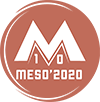The present talk is the result of a collective work on the Swiss Mesolithic site of Murten/Ober Prehl. Located near the Lake Murten in the canton of Fribourg, it was excavated between 1990 and 1991 by Michel Mauvilly in a rescue context (Archaeological Service of the State of Fribourg ; Boisaubert et al., 2008). The excavation uncovered on a surface of 520 m2 several layers of distinct occupations ; the oldest one dated from the Mesolithic. No bone was found, but 2016 lithic artifacts were at least gathered; a majority belongs to the Mesolithic.
As just prelemary papers were published (Mauvilly et al., 2002), it was decided to make a complete study of this material in a master's degree at the University of Burgundy (Rostollan, 2019). Three main objectives were defined: refine the dating of the site, caracterize the nature of the site and assess its place in the regional context. To answer, several approaches have been carried out. The typological study of this collection was completed by the study of the spatial distribution of the remains, the search of the reassemblies and use-wear analysis. Then, thanks to the petrographic analysis conducted by Jehanne Affolter, it was also possible to define the management of raw materials. The results of these approaches will be presented in this paper.
The dating of the site is based on the presence of segments associated with retouched and transverse basal points and isosceles triangles. Such armatures are characteristic of the Early Mesolithic in the Jura (Thévenin, 2008).
More than 99% of the pieces were coordinated, so it is possible to create spatial projections. The results show a high density zone, over an area of about 30 m², and a second one, less larger (15 m2), a few meters West. Lithic reassemblies shows links between these two locations, so potentially contemporaneous. The number of the burned flints allows to hypothesize the existence of a hearth within the dense area, but none in the second one.
The petrographic analysis identifies the diversity of the raw materials found in Murten/Ober Prehl. The pattern of the geographical origins show clarely a predilection for local resources, especialy ölquartzite and radiolarite, which could be collected in a less than 50 km radius. Many elements are also from more than 100 km. The most exotic raw material is a flint from the Ain department, more than 170 km away. Such supply pattern seems to be reminiscent of the one recognized for the Dammartin-Marpain locus 2 in Jura (Séara et Roncin, 2013).
The lithic reassemblies reveal several operating chains, some of conducted entirely on the site – namely local rocks such as fine-grained quartzite -, other ones partialy. These observations complete our knownledge about the circulation of materials.
Furthermore, comparison with other sites allows us to propose a restitution of the cultural landscape in which Murten/Ober Prehl was integrated in the early Mesolithic period. These comparisons are made with sites located in the neighbouring Swiss cantons crossed by the Jura Mountains (Cornaux « Prés du Chêne », Mollendruz) but also in the French departments also crossed by this mountains (Oberlarg, Ruffey-sur-Seille), and finally with sites in south-western Germany (Siebenlinden).
In addition, a few elements from Murten/Ober Prehl deserve to be mentionned, namely numerous sketched pieces. Used for the traitment of animal hard material during the Neolithic period (Le Brun-Ricalens, 2006), their role still unknowmn for the Mesolithic period, and complementary studies must been led.
This brief summary about Murten/Ober Prehl shows the interest of returning to sites excavated a couple of years ago. The aim of this presentation is not only to make this Fribourg open-air site better known, but also to compare it with the advances in Mesolithic archaeological research and to have a reflection about the notion of territory through the supply territory and the cultural terrtory.
Bibliography :
- BOISAUBERT J.-L., BUGNON D., MAUVILLY M. dir. (2008) ‒ Archéologie et autoroute A1, destins croisés : 25 années de fouilles en terres fribourgeoises, premier bilan (1975-2000), Fribourg, Academic Press Fribourg, 475 p.
- LE BRUN-RICALENS F. (2006) ‒ Les pièces esquillées : état des connaissances après un siècle de reconnaissance, PALEO, t. 18, p. 94-115.
- MAUVILLY M., AFFOLTER J., BOISAUBERT J.-L. (2002) ‒ Du Paléolithique final à la fin du Mésolithique dans le canton de Fribourg : état de la question, Annuaire de la Société Suisse de Préhistoire et d'Archéologie, t. 85, p. 12-44.
- ROSTOLLAN P. (2019) - Le mobilier lithique du site de Morat/Ober Prehl (Canton de Fribourg, Suisse) : étude typo-technologique d'un campement mésolithique, mémoire de maîtrise, Université de Bourgogne-Franche-Comté, Dijon, 106 p.
- SÉARA F., RONCIN O. (2013) ‒ Fonds de vallée et fréquentation Mésolithique : l'exemple de Dammartin-Marpain dans le Jura, in B. Valentin, B. Souffi, T. Ducrocq, J.-P. Fagnart, Fr. Séara et Chr. Verjux (dir.), Recherches sur les habitats de plein air entre Loire et Neckar, Actes de la table-ronde internationale de Paris (26-27 novembre 2010), Paris, Société préhistorique française, p. 93-115.
- THÉVENIN A. (2008) ‒ Le mésolithique ancien et moyen de la moitié nord de la France : les grandes lignes de peuplement, in J.-P. Fagnart, A. Thévenin, T. Ducrocq, B. Souffi, P. Coudret (dir.), Le début du Mésolithique en Europe du Nord-ouest, Actes de la table ronde d'Amiens (9-10 octobre 2004), Amiens, Société préhistorique française (Mémoire, XLV), p. 31-50.

 PDF version
PDF version
